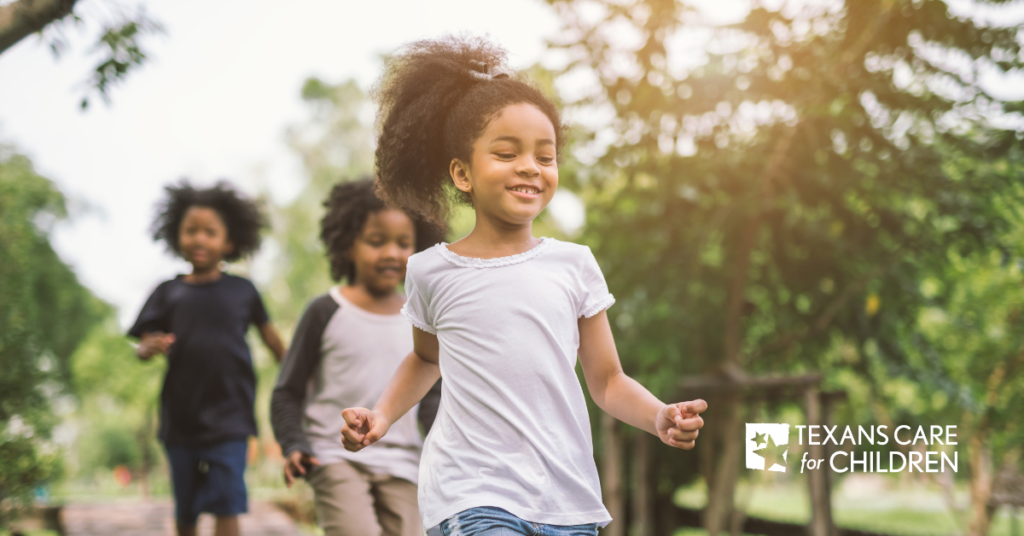The Texas legislative session is heating up, with committees starting to hold hearings on bills and the deadline to file legislation just a few days away. Following up on our posts about 14 good bills for kids and major health care bills of the session, today we bring you 15 more bills that we’re supporting at the Legislature.

The list is far from comprehensive, but it gives you a sense of some of the issues the Legislature is grappling with this session — from child care and student mental health to maternal health, foster care, and school suspensions — and some of the bills to keep an eye on. If you want to stay up to date on these bills and hearings, be sure to sign up for alerts from the Legislature, subscribe to our email updates, and follow us on Twitter.
- SB 708 by Sen. Judith Zaffirini and HB 1682 by Rep. John Raney would collect data on safety and child-caregiver ratios in child care. As noted in the recent Austin American-Statesman investigative series on the state’s child care oversight and policies, Texas has some of the worst standards in the nation. For example, Texas allows a single child care teacher to be responsible for 11 two-year-olds or 15 three-year-olds. A teacher assigned so many young kids will likely have difficulty preventing injuries, as well as difficulty reading a book to the kids or providing other engaging activities that offer the nurturing support that young children need during this important period of brain development.
- SB 568 by Sen. Joan Huffman would advance a series of child care safety reforms. The bill creates a new safety training account; establishes new standards around safe sleeping, including a requirement that any violation results in a letter being sent to every participating parent; requires violation history be documented on a public database; and creates new penalties for violators. As noted above, there has been greater interest in addressing child care safety in Texas since the publication of the Statesman’s investigative series.
- HB 1808 by Rep. Eddie Lucio and SB 952 by Sen. Kirk Watson would update and clarify the state’s minimum standards for nutrition and active play to ensure more children have a healthy start in life. When children are healthy during the first years of life, they are more likely to maintain a healthy weight throughout their childhood, be successful in school, and achieve lifelong health. With the majority of young Texas children spending much of the day in child care settings, child care providers are a key partner to parents in helping young children develop healthy habits for the future.
- HB 255 by Rep. Cesar Blanco would create a Complete Count Commission to develop, recommend, and assist in the administration of a census outreach strategy to encourage full participation in the 2020 federal census in Texas. In the 2010 census, Texas had the highest undercount of young children of any state. A Complete Count Commission can help ensure all Texans — including all children — are counted in order to maximize federal resources that support children’s education, health and other critical needs.
- HB 19 (originally filed as HB 1072) by Rep. Four Price would require local mental health authorities (LMHAs) to employ a mental health professional who would be housed at the regional Education Service Center and serve as a resource for school districts in their region. The bill is part of a two-track approach that the Legislature is taking on children’s mental health this session: 1) psychiatric treatment in the community for Texans with high needs, as proposed in Sen. Jane Nelson’s SB 10 and Rep. Senfronia Thompson’s HB 10, and 2) support in school for a broader range of student mental health needs, as proposed by this and other bills as well as the TEA Safe and Healthy Schools Initiative funded in the House budget.
- HB 18 (originally filed as HB 1069) by Rep. Four Price would enact a number of school-focused measures to support student mental health through district planning and procedures, training of school personnel on effective practices (including trauma-informed education), coordination of school-based and community-linked services and supports, and building students’ knowledge and skills related to mental health.
- HB 906 by Rep. Senfronia Thompson would provide further support for student mental health by establishing a collaborative task force to study school mental health services and training. The study would consider the impact on student achievement and attendance, social emotional learning (SEL) skill-building, promotion of trauma-informed practices, disciplinary action, and disparities.
- HB 65 by Rep. Eric Johnson would improve transparency regarding out-of-school suspensions by requiring school districts to report additional data. To improve behavior and student learning, some Texas school districts are moving away from relying heavily on suspensions, particularly for young students, and instead implementing effective strategies to improve behavior. Yet, as we documented in our report last year, some school district continue to issue extraordinarily high numbers of suspensions to children as young as four years old. We recently testified for the bill, which is still pending in committee.
- HB 25 by Rep. Mary Gonzalez would improve maternal and infant health by ensuring more moms have transportation to prenatal care and postpartum care appointments. Prenatal care reduces the risk that a baby is born premature, with low birth weight, or with other challenges that can lead to a lifetime of health problems or disabilities, like hearing loss, asthma, or cerebral palsy. Texas has a program offering non-emergency medical transportation to Medicaid clients. HB 25 would create a pilot program to fix a glitch in the system that prevents mothers from participating — and attending their medical appointments — if they have a child with them. We recently testified for the bill, which is still pending in committee.
- SB 750 by Sen. Lois Kolkhorst would improve the quality of maternal and newborn health care through a variety of efforts. The bill directs HHSC and Medicaid health plans to develop and implement an evidence-based program to deliver enhanced prenatal care services to high-risk pregnant women in Medicaid. It also directs HHSC to examine the scope of services covered in Healthy Texas Women and assess whether a limited postpartum care services package should be provided to new mothers in Healthy Texas Women. Additionally, the bill seeks to improve transitions between health programs by directing Medicaid health plans to coordinate the transition of care from Medicaid for Pregnant Women to Healthy Texas Women after a baby is born.
- SB 436 by Sen. Jane Nelson and HB 1292 by Rep. Four Price would prevent and address substance use challenges affecting moms by directing DSHS and the Texas Maternal Mortality & Morbidity Task Force to implement initiatives that: improve screening to better identify and care for women with opioid use disorder; improve referrals to treatment and continuity of care; increase medication-assisted treatment options; and optimize health care provided to pregnant women with opioid use disorder and to newborns. This effort should go hand-in-hand with investments in substance use treatment and recovery supports, including medication-assisted treatment. (See our issue brief and our testimony on the Senate version of the state budget.)
- HB 1907 by Rep. Donna Howard would ensure parents, caseworkers, judges, and other adults caring for youth in foster care receive training on the most effective methods of communicating with these youth about healthy relationships and pregnancy prevention. Our research showed that although youth in foster care hoped to learn about healthy relationships and reproductive health from foster parents or caseworkers, only 41 percent of professionals working with youth in foster care felt comfortable talking to youth about these critical, yet sensitive topics. The bill complements other legislation filed by Rep. Howard to support pregnant and parenting youth in foster care, as noted in our previous blog post.
- SB 480 by Sen. Kirk Watson would ensure more youth exiting foster care have the skills and supports they need to be successful adults. The bill is based on recommendations from the DFPS SB 1758 Workgroup and incorporates some policy changes that Fifth Circuit judges acknowledged are best practices. The bill would ensure 14- and 15-year-olds in foster care are accessing supports sooner to help their transition to independent living. The bill would also help 17-year-olds understand the medications they are taking, ensure more youth have stable housing secured before exiting care, and more.
- HB 123 by Rep. James White would ensure that youth leaving foster care have access to identifying documents like their birth certificate, Social Security card, or state identification. These personal documents are critical to a youth securing a job, housing, higher education, and health care.
- SB 951 by Sen. Kirk Watson would create a task force to assess Texas’ readiness to implement the Family First Prevention Services Act. The task force would evaluate and make recommendations on the development of high-quality foster homes that meet the unique needs of children across Texas, prevent children from entering foster care when they can safely stay with their families, and maximize funding opportunities (and minimize the potential loss of funds) under the Family First Act.



